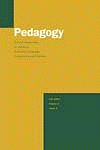
The Fall issue of the academic journal
Pedagogy: Critical Approaches to Teaching Literature, Language, Composition, and Culture (Volume 5, Issue 3), edited by Duke University Press contains several papers related with the teaching of the Brontës and their works:
Teaching the Brontës Today: Notes from a Roundtable pp. 445-446(2) Author: Gates, Barbara T. Excerpt:
"The Brontës live, both in popular culture and in the classroom. Proof of this statement lies all around us. Just pick up a copy of Jasper Fforde's popular novel The Eyre Affair (2002) and learn what really happened to Mr. Rochester and Bertha Mason Rochester during the deadly blaze at Thornfield. Or rent Mike Leigh's charming film Career Girls (1999) and watch two young British women randomly opening Wuthering Heights to play a kind of sortes Virgilianae with Emily Brontë's text. Students today also find the Brontës alluring and tend to know the popular culture that surrounds the sisters and their texts. So how does one teach the Brontës to college- and university-age... "
Teaching Jane Eyre and Wuthering Heights in a Survey of the Nineteenth-Century English Novel pp. 447-451(5) Author: Conway, Kathleen Excerpt:
"In teaching the nineteenth-century English novel, I have several goals. I want to engage my students in reading and enjoying a wonderful group of novels—novels that are "good reads." In addition, the course can help students to understand the genre by studying its development during a period of great growth. And finally, because novelists usually create a rich social context for the characters and events they describe, a look at the novels of any given period provides a window into the culture that produced them. To follow a prominent thread in the genre, we examine the novels as examples of the bildungsroman or novel of education. "
Teaching Wuthering Heights and Jane Eyre in a Variety of Courses pp. 451-456(6) Author: McElligott, Mary BradleyExcerpt:
"I have taught for more years than I think wise to enumerate at Marymount College in Tarrytown, New York, a small, liberal arts college for women that has recently consolidated with Fordham University. Given this particular teaching experience, I would like to make a few points at the outset. First, my students have all been young women, which has, of course, influenced these students' responses to Wuthering Heights and Jane Eyre. My students frequently do speculate about what "guys" would think of certain aspects of the novels (Jane's hearing Rochester's voice at the end of the narrative springs immediately to mind) and, indeed, how their own responses might differ had said "guys" been present for our discussions. Second, before the consolidation with Fordham in 2002, many of our English majors did not plan to attend graduate school immediately upon graduation. This, and the [End Page 451] fact that Marymount is a women's college, created a campus culture in which classroom situations tend to be supportive rather than competitive and geared to teaching rather than research. These first two points will certainly be reflected in my comments, which will most often be in the form of questions I ask the students to stimulate their thinking about the novels. Third, since Marymount's number of English department... "Problematic Mythmaking pp. 456-460(5) Author: Gates, Barbara T.
Excerpt
"For the thirty years I have been teaching seminars in the work of the Brontës, I have been haunted by the so-called Brontë myth—the accretion of anecdotes, tales, memorabilia, and secondary texts that have come to comprise the Brontë story. This "myth" has always troubled me, less because it promotes bifurcated Brontës—Brontës with lives and Brontës with works—than because it entices students to read literary texts simply as places to look for partially concealed Brontë sisters. Of course canonization of the Brontës has been popular at least since Elizabeth Gaskell's remarkable Life of Charlotte Brontë appeared in 1858. This master text separated Charlotte Brontë, dutiful daughter and wife, from Currer Bell, professional writer, only to prompt subsequent readers to put the two back together again, rather like Humpty Dumpty. "Categories: Scholar, Jane_Eyre, Wuthering_Heights, Charlotte_Brontë, Emily_Brontë









0 comments:
Post a Comment